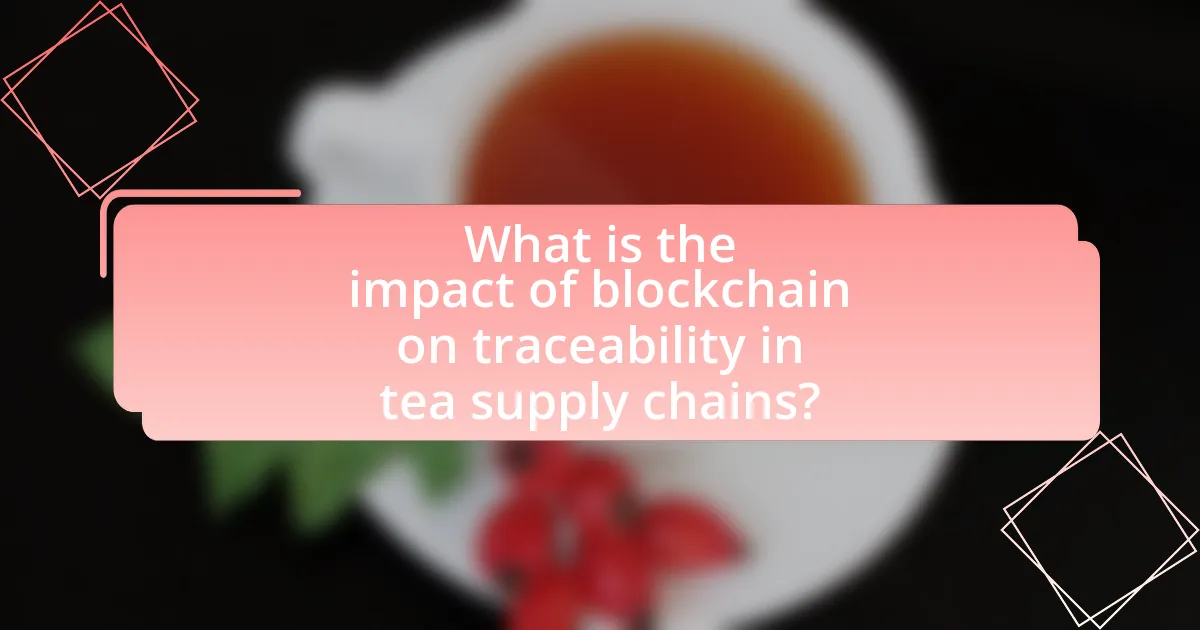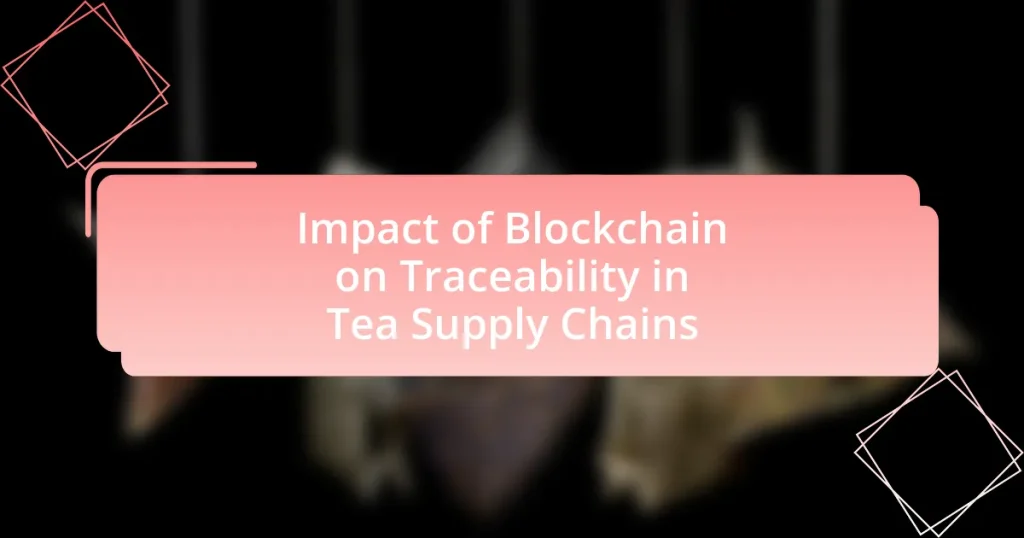The article examines the impact of blockchain technology on traceability in tea supply chains, highlighting its role in enhancing transparency, reducing fraud, and ensuring compliance with safety standards. Key features of blockchain, such as immutability and decentralization, facilitate real-time tracking of tea products from farm to consumer, thereby improving data integrity and consumer trust. The discussion includes the importance of traceability for food safety, the risks associated with its absence, and the challenges faced in implementing blockchain, such as scalability and regulatory issues. Additionally, the article explores how blockchain can promote sustainability and ethical sourcing in the tea industry, along with best practices for effective implementation.

What is the impact of blockchain on traceability in tea supply chains?
Blockchain significantly enhances traceability in tea supply chains by providing a transparent, immutable ledger that records every transaction from farm to consumer. This technology allows stakeholders to verify the origin, quality, and journey of tea products, thereby reducing fraud and ensuring compliance with safety standards. For instance, a study by the International Journal of Supply Chain Management found that implementing blockchain in supply chains can increase traceability accuracy by up to 90%, enabling consumers to access detailed information about the tea they purchase, including its production practices and certifications.
How does blockchain technology enhance traceability in tea supply chains?
Blockchain technology enhances traceability in tea supply chains by providing a decentralized and immutable ledger that records every transaction and movement of tea products from farm to consumer. This transparency allows all stakeholders, including farmers, processors, distributors, and retailers, to access real-time data about the origin, processing, and distribution of tea. For instance, a study by the International Journal of Supply Chain Management highlighted that implementing blockchain in supply chains can reduce fraud and improve product authenticity by ensuring that each batch of tea can be traced back to its source, thus increasing consumer trust.
What are the key features of blockchain that support traceability?
The key features of blockchain that support traceability include immutability, transparency, and decentralization. Immutability ensures that once data is recorded on the blockchain, it cannot be altered or deleted, providing a permanent record of transactions. Transparency allows all participants in the supply chain to access the same information, fostering trust and accountability. Decentralization eliminates the need for a central authority, enabling peer-to-peer verification of transactions, which enhances the reliability of the traceability process. These features collectively ensure that every step in the tea supply chain can be tracked and verified, from cultivation to consumption, thereby improving overall traceability.
How does blockchain ensure data integrity in tea supply chains?
Blockchain ensures data integrity in tea supply chains by providing a decentralized and immutable ledger that records every transaction related to the tea’s journey from farm to consumer. Each transaction is encrypted and linked to the previous one, creating a secure chain of information that cannot be altered retroactively. This transparency allows all stakeholders, including farmers, processors, and retailers, to verify the authenticity and quality of the tea at any point in the supply chain. For instance, a study by the International Journal of Supply Chain Management highlighted that implementing blockchain technology in agricultural supply chains significantly reduces fraud and enhances traceability, thereby ensuring that the data remains accurate and trustworthy throughout the entire process.
Why is traceability important in the tea supply chain?
Traceability is crucial in the tea supply chain because it ensures transparency and accountability from production to consumption. This transparency helps in verifying the quality and safety of tea products, which is essential for consumer trust and regulatory compliance. For instance, traceability allows stakeholders to track the origin of tea leaves, ensuring they are sourced from sustainable and ethical practices. Additionally, a study by the Food and Agriculture Organization highlights that traceability systems can reduce food fraud and enhance food safety, which is particularly important in the tea industry where quality can vary significantly.
What are the risks of lacking traceability in tea supply chains?
Lacking traceability in tea supply chains poses significant risks, including food safety issues, fraud, and reputational damage. Without traceability, it becomes challenging to identify the source of contamination during food safety incidents, potentially leading to widespread health risks. For instance, the 2008 melamine scandal in China highlighted how untraceable supply chains can result in severe public health crises. Additionally, the absence of traceability increases the likelihood of fraud, such as mislabeling tea products, which can undermine consumer trust and lead to financial losses for legitimate producers. Furthermore, brands that cannot demonstrate traceability may suffer reputational damage, as consumers increasingly demand transparency regarding product origins and ethical sourcing practices. This lack of accountability can ultimately affect market competitiveness and consumer loyalty.
How does traceability affect consumer trust in tea products?
Traceability significantly enhances consumer trust in tea products by providing transparency regarding the origin and journey of the tea from farm to cup. When consumers can verify the source of their tea, including details about cultivation practices and processing methods, they are more likely to feel confident in the quality and safety of the product. Research indicates that 73% of consumers are willing to pay more for products that offer complete traceability, reflecting a strong correlation between traceability and consumer confidence. This trust is further reinforced by the use of blockchain technology, which ensures that the information is immutable and easily accessible, allowing consumers to trace their tea’s history accurately.
What challenges does blockchain face in tea supply chains?
Blockchain faces several challenges in tea supply chains, including scalability, data accuracy, and stakeholder adoption. Scalability issues arise due to the high volume of transactions and the need for real-time data processing, which can overwhelm existing blockchain networks. Data accuracy is critical, as the effectiveness of blockchain relies on the integrity of the information entered; any inaccuracies can lead to misinformation throughout the supply chain. Additionally, stakeholder adoption is a significant hurdle, as various participants, from farmers to distributors, may lack the technical knowledge or resources to implement blockchain technology effectively. These challenges hinder the full realization of blockchain’s potential to enhance traceability in tea supply chains.
What are the technological barriers to implementing blockchain in tea supply chains?
The technological barriers to implementing blockchain in tea supply chains include scalability issues, integration with existing systems, and the need for standardized protocols. Scalability challenges arise because blockchain networks can struggle to handle the high transaction volumes typical in global supply chains, potentially leading to delays and inefficiencies. Integration difficulties stem from the necessity to connect blockchain technology with legacy systems used by various stakeholders in the tea supply chain, which can be complex and costly. Additionally, the lack of standardized protocols across different blockchain platforms can hinder interoperability, making it difficult for various participants to communicate and share data effectively. These barriers collectively impede the widespread adoption of blockchain in enhancing traceability within tea supply chains.
How do regulatory issues impact the adoption of blockchain for traceability?
Regulatory issues significantly hinder the adoption of blockchain for traceability in tea supply chains by creating uncertainty and compliance challenges for stakeholders. For instance, varying regulations across countries can complicate the implementation of blockchain solutions, as businesses must navigate different legal frameworks regarding data privacy, consumer protection, and food safety. Additionally, the lack of standardized regulations can lead to inconsistent practices, making it difficult for companies to ensure compliance and gain consumer trust. According to a report by the World Economic Forum, regulatory uncertainty is one of the top barriers to blockchain adoption, as it can deter investment and innovation in the technology.
How can blockchain improve sustainability in tea supply chains?
Blockchain can improve sustainability in tea supply chains by enhancing traceability and transparency throughout the production process. By utilizing blockchain technology, each step of the tea supply chain—from cultivation to processing to distribution—can be recorded in an immutable ledger, allowing stakeholders to verify the origin and journey of the tea. This increased transparency helps ensure that sustainable farming practices are followed, as consumers can access detailed information about the environmental impact and ethical standards of the tea they purchase. For instance, a study by the World Economic Forum highlights that blockchain can reduce fraud and promote responsible sourcing, which is crucial for maintaining sustainable practices in agriculture.
What role does blockchain play in promoting ethical sourcing of tea?
Blockchain plays a crucial role in promoting ethical sourcing of tea by providing a transparent and immutable ledger that tracks the entire supply chain from farm to consumer. This technology enables stakeholders to verify the origin of tea, ensuring that it is sourced from farms that adhere to ethical labor practices and sustainable farming methods. For instance, a study by the World Economic Forum highlights that blockchain can reduce fraud and increase accountability in agricultural supply chains, thereby fostering trust among consumers who are increasingly concerned about ethical sourcing. By allowing consumers to access verified information about the tea’s journey, blockchain enhances traceability and empowers informed purchasing decisions, ultimately supporting ethical practices in the tea industry.
How can blockchain help reduce waste in tea supply chains?
Blockchain can help reduce waste in tea supply chains by enhancing traceability and transparency throughout the production and distribution processes. By utilizing blockchain technology, each step of the tea supply chain can be recorded in an immutable ledger, allowing stakeholders to track the origin, quality, and handling of tea products in real-time. This increased visibility helps identify inefficiencies, such as overproduction or spoilage, and facilitates better inventory management. For instance, a study by the World Economic Forum highlighted that blockchain can reduce food waste by up to 30% by improving supply chain efficiency and reducing the time products spend in transit. Thus, the implementation of blockchain in tea supply chains directly contributes to minimizing waste through improved traceability and operational efficiency.
What are the future trends of blockchain in tea supply chains?
Future trends of blockchain in tea supply chains include enhanced traceability, improved transparency, and increased efficiency in transactions. Blockchain technology allows for real-time tracking of tea from farm to consumer, ensuring that each step of the supply chain is recorded and verifiable. This capability addresses issues such as fraud and quality assurance, as consumers increasingly demand information about the origin and handling of their products. According to a report by the World Economic Forum, implementing blockchain can reduce supply chain costs by up to 20% while improving trust among stakeholders. Additionally, the integration of smart contracts within blockchain systems can automate processes, further streamlining operations and reducing delays.
How might advancements in blockchain technology affect tea traceability?
Advancements in blockchain technology can significantly enhance tea traceability by providing a secure, transparent, and immutable ledger for tracking the entire supply chain. This technology allows stakeholders, from farmers to consumers, to access real-time data regarding the origin, processing, and distribution of tea products. For instance, a study by the World Economic Forum highlights that blockchain can reduce fraud and improve food safety by ensuring that every transaction is recorded and verifiable. By implementing blockchain, tea producers can demonstrate authenticity and quality, thereby increasing consumer trust and potentially leading to higher market prices.
What innovations are emerging in the intersection of blockchain and tea supply chains?
Innovations at the intersection of blockchain and tea supply chains include enhanced traceability, improved transparency, and increased efficiency in tracking tea from farm to consumer. Blockchain technology enables the creation of immutable records that document every step of the supply chain, allowing stakeholders to verify the origin and quality of tea products. For instance, companies like TeaChain are utilizing blockchain to provide consumers with real-time data on the tea’s journey, ensuring authenticity and ethical sourcing. This innovation not only builds consumer trust but also helps producers comply with regulatory standards, as all transactions and processes are securely recorded and easily accessible.
What best practices should be followed when implementing blockchain for tea traceability?
To effectively implement blockchain for tea traceability, organizations should prioritize data accuracy, stakeholder collaboration, and user-friendly interfaces. Data accuracy ensures that all information recorded on the blockchain is reliable, which is critical for maintaining consumer trust; for instance, using IoT devices to capture real-time data from tea farms can enhance this accuracy. Stakeholder collaboration involves engaging all participants in the supply chain, from farmers to retailers, to ensure comprehensive data sharing and transparency; this can be facilitated through workshops and training sessions. Lastly, user-friendly interfaces are essential for enabling all stakeholders to easily access and interact with the blockchain system, which can be achieved by designing intuitive applications that require minimal technical expertise. These best practices collectively enhance the effectiveness of blockchain in improving traceability in tea supply chains.


